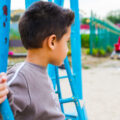
By Kirsty Hammonds, Coram
In my role as child placement consultant in Coram’s activity days team, I come across many siblings who will not be able to live together permanently.
This may be due to older siblings already having been adopted or even being deemed too old to be adopted and therefore remaining in long-term foster care. Also, some children are part of very large siblings groups, where it is just not possible for them to all to stay living together.
A report from the Children’s Commissioner for England last year found that 37% of children in care had been separated from at least one sibling in their initial placement. This is despite a 2017 literature review by Oxford University’s Rees Centre for Research in Fostering and Education indicating that outcomes for children placed with siblings in foster care were mostly better than for those placed apart from siblings.
Sibling contact is associated with positive wellbeing outcomes for children including identity formation, a sense of belonging and overall mental health, as well as long-term possibilities for a supportive relationship throughout a child’s life, and children themselves often express a strong desire to stay connected to their siblings.
Barriers to sibling contact
However, there are a number of challenges that can impede sibling contact.
The logistics of co-ordinating visits between siblings who may live in different locations with potentially conflicting schedules is complicated. The social care sector is facing resource constraints around staffing, funding and transport, which can affect its ability to prioritise and facilitate sibling contact.
Parents and carers can feel overwhelmed at the task of facilitating sibling relationships without the support of professionals. Complex family dynamics may require careful planning, assessment and supervision.
Children’s dissatisfaction with current arrangements
There is also a lack of existing services offering support or facilitation for sibling relationships, while research indicates that young people may be dissatisfied with the provision that does exist in terms of quality, frequency and degree of supervision by social workers.
The 2022 Coram Voice report, Staying Connected, found that 22% of 8- to 10-year-olds and 31% of 11- to 18-year-olds felt that they saw their siblings too little. Children reported they did not want to meet their siblings in ‘drab’ contact centres and wished to be able to do normal activities with their brothers and sisters.
As a team, we were determined to find a solution to help overcome these barriers. We considered how we could adapt our longstanding ‘activity days’, which provide an informal setting for children in care to meet prospective adopters and foster carers, to a service for siblings.
‘Sibling time’
We developed the concept of ‘sibling time’, a fun, supportive, therapeutic and safe environment for children who are looked after or adopted to have the opportunity to come together and connect with their siblings.
We received funding from the Hadley Trust to develop a pilot event in Leicestershire. After careful planning with the local authority and information sessions with the parents and carers of the children and young people invited, this took place in August 2023.
The three-hour session was facilitated by nine professionals, including staff from Coram’s activity days team, social workers and play specialists. The focus of the session was child-led free play with supported activities.
Ten young people attended the event, and there were some very emotional moments during the session.
Emotional reunions
Seeing two sisters being reunited with their brother whom they had not seen for five years gave us all goose bumps. Within minutes it was like no time had gone past and they were enjoying each other’s company, playing, interacting and having fun.
An older teen was there to spend time with their baby brother who was adopted. Again, it felt a privilege to be part of their time together, watching the older sibling get down and play with their baby brother, support him throughout the afternoon and help give him his lunch.
All the children were supported in their siblings groups by staff members and each sibling group had the chance to go in our fun ‘photo booth’ to have a picture altogether. We then printed and framed these on the day so that all the children left with a photo memory of the afternoon.
Parents and carers stayed close by, but had the opportunity to undertake some training in another room, around various topics such as supporting sibling contact and life story work, and get to know each other as well.
Positive evaluation
The Coram Impact and Evaluation team undertook an evaluation of the pilot and the findings were overwhelmingly positive.
Very positive interactions between the siblings were observed. The parents and carers interviewed felt that well-supported and carefully facilitated contact helped to build relationships between the parents and carers of siblings and the siblings themselves.
Professionals’ reflections echoed what parent and carers had told us. They talked about the importance of sibling contact for adopted or fostered children, and the lack of existing facilitation or support.
One social worker noted: “In an area where there isn’t a Coram, or the local authority don’t do that, it is literally up to the individual parents. If they, decide to meet up with the other adoptive family, brilliant. If they don’t, it’s not happening.”
Apprehensions among children and parents
There were also common apprehensions about taking part. One child interviewed said they were “excited” but perhaps a ‘little bit nervous as well’ about taking part in sibling time.
Parents were “concerned about resurrecting feelings between siblings, how they would manage difficult questions, and the after-effects of attending an event like that” and professionals noted there were safeguarding issues for some children.
But due to the carefully curated setting and preparation, parents and carers felt like their children were not negatively affected by the event.
Shifting social work culture
It was so positive to see the memories the children and young people made together.
Our hope is to offer this service nationwide and help shift social work culture towards a greater awareness of the benefits of sibling relationships.
We need to listen to children and do all we can to support and encourage relationships between brothers and sisters, so that no child grows up not knowing their siblings.
There will be an online information session on the sibling time service on 19 April from 10am-11.30am. To register, please contact: adoption.activitydays@coram.org.uk






 Bournemouth, Christchurch and Poole
Bournemouth, Christchurch and Poole  Hampshire County Council
Hampshire County Council  Lincolnshire County Council
Lincolnshire County Council  Norfolk County Council
Norfolk County Council  Northamptonshire Children’s Trust
Northamptonshire Children’s Trust  South Gloucestershire Council
South Gloucestershire Council  Wiltshire Council
Wiltshire Council  Wokingham Borough Council
Wokingham Borough Council  Children and young people with SEND are ‘valued and prioritised’ in Wiltshire, find inspectors
Children and young people with SEND are ‘valued and prioritised’ in Wiltshire, find inspectors  How specialist refugee teams benefit young people and social workers
How specialist refugee teams benefit young people and social workers  Podcast: returning to social work after becoming a first-time parent
Podcast: returning to social work after becoming a first-time parent  Podcast: would you work for an inadequate-rated service?
Podcast: would you work for an inadequate-rated service?  Family help: one local authority’s experience of the model
Family help: one local authority’s experience of the model  Workforce Insights – showcasing a selection of the sector’s top recruiters
Workforce Insights – showcasing a selection of the sector’s top recruiters 

 Facebook
Facebook X
X LinkedIn
LinkedIn Instagram
Instagram
Great to see this work going on to support sibling relationships. In Fife, Scotland, there is a service Siblings Reunited (STAR) that focuses on supporting time together for siblings living separately in care. AFKA Scotland recently published an evaluation of the service which picks up on some similar themes as highlighted above, and more. I was lead author of the report. It can be found at https://afkascotland.org/research-star-evaluation/
We also have a community of practice to share learning and improve practice in supporting sibling relationships: https://www.standupforsiblings.co.uk/professionals/community-of-practice-for-siblings/